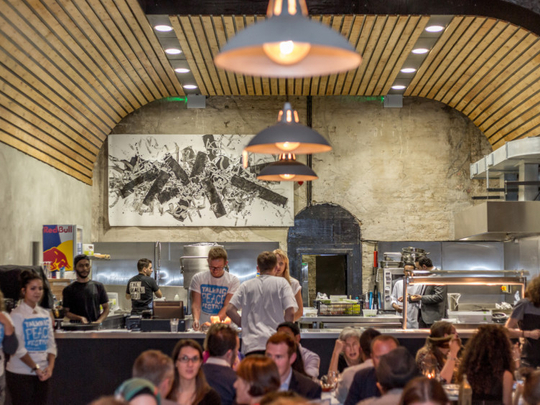
London: Chef Haitham Yassin usually cooks Syrian food at the Ayam Zaman restaurant in Shepherd’s Bush, west London. But on Wednesday night he was serving Damascene dishes at a pop-up restaurant in a railway arch under Waterloo station, with trains rumbling in the background. Yassin was taking part in an event that was not just about food. For the 50 diners seated at long tables, it was also a chance to hear and learn about the Syrian conflict, which has left more than 240,000 dead and is largely behind the biggest refugee crisis to confront Europe since the Second World War.
Large posters gave a potted history of Syria from its independence from France in 1946 until the present day. Another displayed an Arab saying: “Once you eat with someone you can’t betray them.”. Organised by International Alert, an NGO that focuses on peacebuilding, the evening was part of a series introducing diners to food from conflict zones — Syria, Nepal, Armenia, Turkey and Colombia.
Two Syrians who belong to a group called the Syrian Platform for Peace, which seeks to bring together Syrians in the UK, took turns to discuss the conflict. As diners tucked into baba ghanoush (grilled aubergine salad) and harah isba (pasta with tamarind and lentils), Talal Al Mayhani, a medical researcher at Cambridge university, sought to find a ray of hope in the devastation.
Syria was a battlefield now, but its culture, going back thousands of years, will go on, he insisted. “Culturally, Syria will survive as long as there are Syrians,” he said, against the background noise of skateboarders. Asked about David Cameron’s recent announcement that Britain will take 20,000 refugees over five years, Mayhani, who came to Britain from Aleppo in 2006, was diplomatic. “The announcement is very welcome. I hope it will be implemented,” he said. “Britain last year said it would take 900 Syrian refugees, but only 200 have made it to the UK. The bigger responsibility is to tackle the original problem in Syria, the root of this crisis.”
For Reem Al Assil, who fled Damascus in 2012, after being arrested and banned from travelling outside Syria, the only way out was for the president, Bashar Al Assad, to leave, although she was less clear as to how this could be done. Assil said Syrians were shocked when the US and Britain failed to take action against Al Assad, when he crossed President Barack Obama’s red line by using chemical weapons in 2013.
“We thought it would be the end of Al Assad,” she said. “But the international community didn’t do anything. What we had was just words. We need UN troops to establish a minimal level of security so humanitarian supplies can be provided.”
For some diners, attending the event was a way to help alleviate the refugee crisis. Kat Adam, who came to Britain from Germany seven years ago, said she did not feel that Britain was pulling its weight, unlike her native Germany, which expects to receive 800,000 refugees this year. “This government needs pushing,” said Adam, a trainee project engineer, adding that it was unacceptable for Britain to pick and choose which refugees could come. Adam and her friend, Alex Lockwood, from Australia, a construction project manager, said they were willing to receive a refugee into their home.
“We would definitely take in a refugee,” he said. “We have a sofa bed in the front room. We would be willing to take someone and work out the details about long they would stay later.” Claire McKeown, director of Action on Disability and Development, an NGO, was also critical of the UK response. “My mother’s family took in German Jews during the war and when she was 13, was evacuated to Boston,” she said.
“I just feel sad that that spirit doesn’t seem to be here any more.” The evening culminated with fattet makdous, a sumptuous main course from Damascus of baby aubergine stuffed with minced lamb, served in warm yoghurt sauce, followed by mouhalabiah, a traditional milk pudding. The evening was intended to give a glimpse into Syria’s rich culture, with food as a conduit, but the subject of war was unavoidable.
Yassin, still in his chef’s apron, said the West should arm Syrians to get rid of Al Assad and Daesh. “They need equipment. The West and the gulf states give them only enough weapons to survive,” he said. “We need anti-aircraft weapons to bring down the planes and helicopters which are dropping explosives, destroying the people. [Daesh], we’ll take care of them.” A resident in the UK for 37 years, he said his family was scattered in Jordan, South Africa and Dubai, but his mother was still in Damascus and did not want to leave. “She says: ‘I was born here and I will die here.’”












